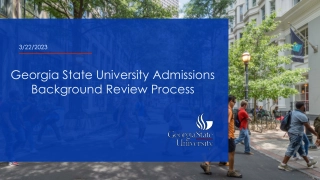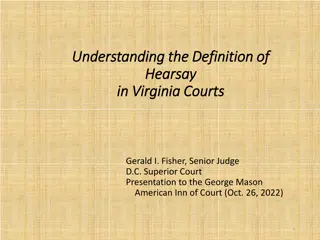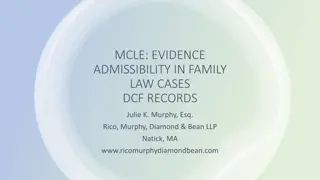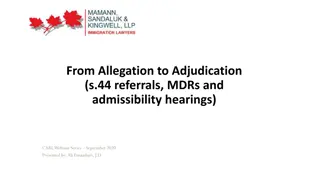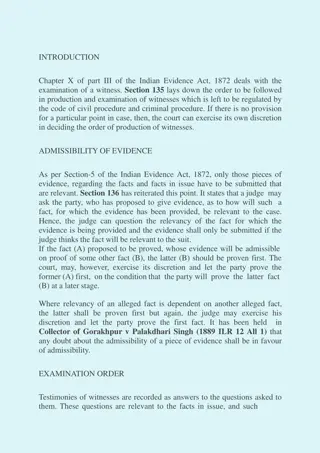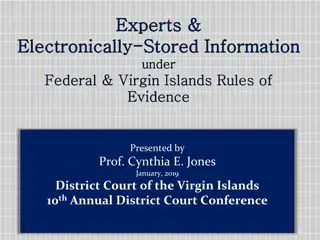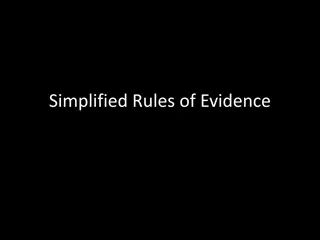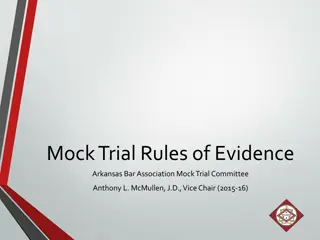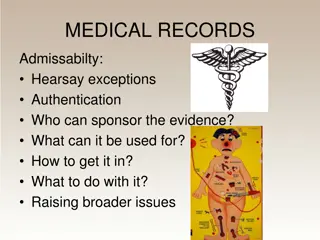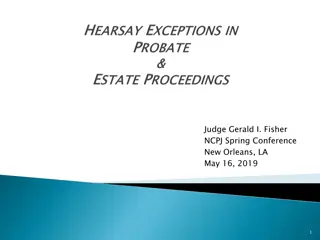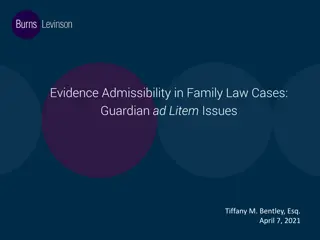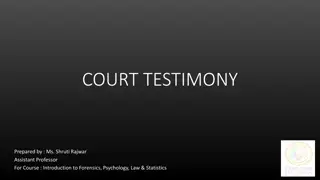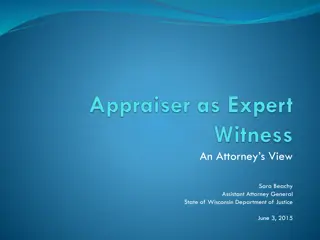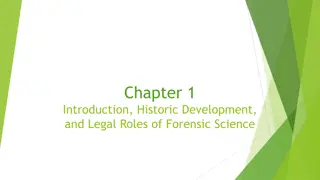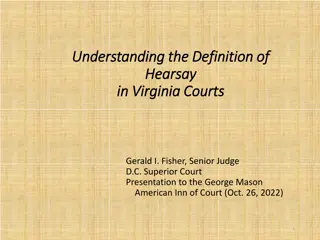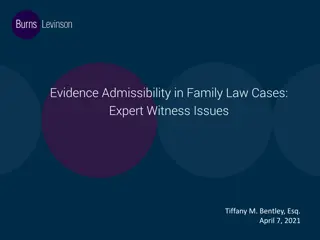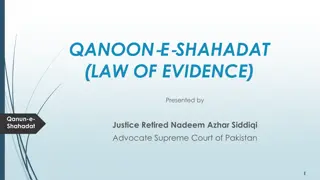Georgia State University Admissions Background Review Process
Georgia State University conducts a comprehensive Admissions Background Review (ABR) process to assess applicants' admissibility based on reported information and potential threats to the campus. The ABR Committee evaluates responses to specific admissions background questions, referring cases invol
1 views • 11 slides
Understanding the Definition of Hearsay in Virginia Courts by Gerald I. Fisher, Senior Judge
Preliminary principles and rules regarding hearsay in Virginia courts, including the effective date of the Virginia Rules of Evidence, application of rules in various trial scenarios, criteria for admissibility of evidence by trial judges, and reasons for the legal distrust of hearsay evidence. The
1 views • 78 slides
Admissibility of Evidence in Family Law Cases & DCF Records
Explore the admissibility of evidence in family law cases and the handling of Department of Children and Families (DCF) records in civil proceedings. The regulations for releasing records, obtaining consent, and seeking court orders are detailed, emphasizing the importance of protecting the best int
1 views • 13 slides
Legal Provisions on Admission and Confession in Criminal Proceedings
The content highlights key sections related to admission and confession in criminal proceedings. It defines admission and explains the relevance of inducement, threat, or promise in a confession. It also emphasizes restrictions on confessions made to a police officer. These sections play a crucial r
0 views • 28 slides
Section 44 Process in Immigration Adjudication
The process from allegation to adjudication in immigration cases involves Section 44 referrals, MDRs, and admissibility hearings under IRPA. Officers have discretion to write reports or issue removal orders based on inadmissibility opinions. Procedural fairness is essential, including providing deta
0 views • 19 slides
Examination of Witnesses under Indian Evidence Act, 1872
Chapter X of Part III of the Indian Evidence Act, 1872, outlines the process of examining witnesses, including the order of production and admissibility of evidence. Sections 135 to 141 delve into the rules governing the examination-in-chief, cross-examination, and re-examination of witnesses, empha
2 views • 8 slides
Understanding Electronically Stored Information in Legal Cases
This presentation covers the admissibility and authentication of Electronically Stored Information (ESI) under the Federal and Virgin Islands Rules of Evidence. Topics include recent changes to the rules, expert testimony on ESI, hearsay objections, and the analysis of admissibility criteria such as
0 views • 43 slides
Call for Proposals: Supporting Vulnerable Youth in West Nile Region
Encouraging vulnerable youth in West Nile Region to develop sustainable micro- and small businesses for resilience and economic integration. Information sessions include WeWork introduction, objectives, admissibility criteria, application process, and guidelines. Enabel's Country Portfolio Objective
0 views • 62 slides
Understanding Simplified Rules of Evidence in Trial Proceedings
Simplified Rules of Evidence outline key principles such as leading questions, narration, relevance, hearsay, opinions, and procedures in a nutshell. Admissibility of evidence depends on arguments as well. Learn how to handle objections effectively to navigate legal proceedings smoothly.
0 views • 35 slides
Understanding Mock Trial Rules of Evidence
Mock Trial Rules of Evidence are crucial for determining the admissibility of testimony and evidence in a trial setting. Students preparing for cases need to assess evidence admissibility, make timely objections, and be prepared to defend testimony. The rules cover objections, specific objections ty
0 views • 36 slides
Understanding Medical Records in Legal Proceedings
Medical records play a crucial role in legal cases as evidence, subject to rules like authentication and exceptions to hearsay. Exhibits such as ambulance reports and discharge summaries are commonly used. Hearsay exceptions like statements for medical diagnosis and treatment are allowed. Proper cer
0 views • 17 slides
Understanding Hearsay Rules and Exceptions in Legal Proceedings
Hearsay evidence, which is an out-of-court statement introduced for the truth of its content, is considered less reliable in court due to factors like lack of oath, inability to see demeanour of declarant, and absence of cross-examination. Various historical judgments and legal exceptions allow cert
0 views • 90 slides
Understanding Guardian ad Litem in Family Law Cases
Exploring the role of a Guardian ad Litem (GAL) in family law cases, from appointment to post-report actions such as settling the case, discovering materials, and preparing for trial. The admissibility of GAL reports as trial exhibits, cross-examination strategies, and key legal precedents related t
0 views • 9 slides
Understanding Expert Testimony and Procedures in Court
This document discusses the importance of expert testimony in court proceedings, covering topics such as admissibility, procedures for forwarding exhibits to experts, court preparation, examination processes, and ethics in forensic science. It emphasizes the need for experts to testify, the formalit
0 views • 11 slides
Collective Redress Regime in Netherlands: Evolution and Current Framework
The collective redress regime in the Netherlands has evolved over the years, with significant changes introduced since January 2020. Under the current framework, the law allows for claiming monetary damages collectively, with specific criteria for admissibility and stricter requirements for represen
0 views • 9 slides
Understanding Daubert Standard in Expert Testimony: A Legal Analysis
Explore the Daubert standard for expert testimony, focusing on the rules of admissibility, qualifications, reliability, and methodology. Learn how judges act as gatekeepers to prevent conjecture and speculation in court. Discover the importance of scientific foundation and peer review in expert opin
0 views • 27 slides
Role of Forensic Science in Criminal Justice System
Explore the evolution of forensic science, legal aspects, and its vital role in criminal investigations. Topics covered include definitions of forensic science and criminalistics, historical development, Locard's Exchange Principle, CSI Effect, admissibility of scientific evidence, and the impact of
0 views • 36 slides
Understanding Hearsay in Virginia Courts - Key Principles and Rules
Virginia's rules of evidence, particularly regarding hearsay, have specific principles and rules that guide the admissibility of evidence in various trial settings. The presentation by Judge Gerald I. Fisher sheds light on how the court determines the admissibility of evidence, including considerati
0 views • 54 slides
Expert Witness Issues in Family Law Cases
Explore the admissibility of evidence in family law cases involving expert witnesses, including expert interrogatories, reports, depositions, motions in limine, direct examination, and cross-examination strategies. Delve into Daubert/Lanigan issues, pretrial disclosures, qualifications, bias, relati
0 views • 6 slides
Understanding Qanun-e-Shahadat: Law of Evidence in Pakistan
Qanun-e-Shahadat Order 1984 replaced the Evidence Act of 1872 in Pakistan, aiming to align the law of evidence with Islamic principles. This law is crucial for judicial proceedings, governing the admissibility of oral and documentary evidence, primary and secondary evidence, and resolving conflicts
0 views • 22 slides
